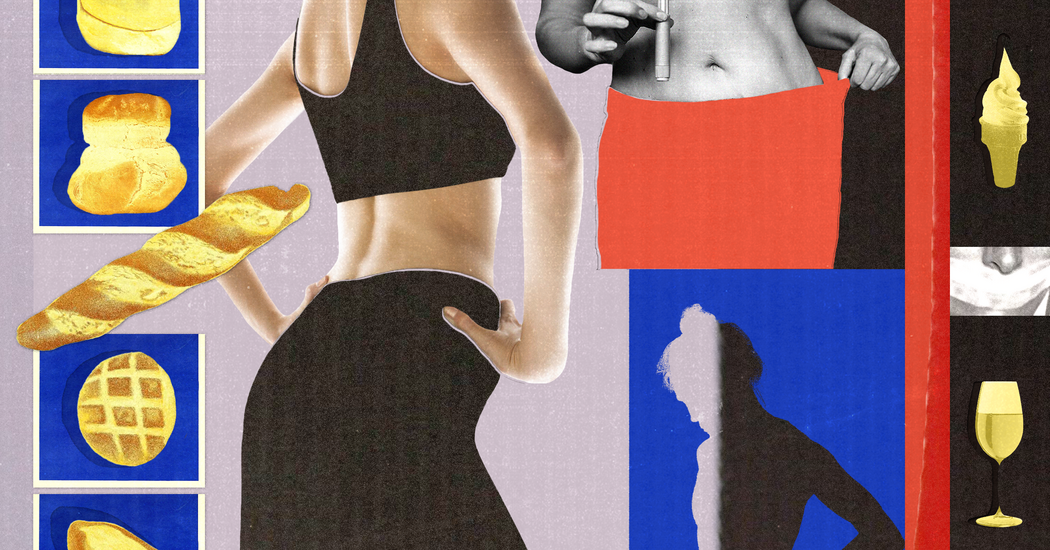Every time I sit down to eat, I hear a woman’s voice in my head. Sometimes she is from New York City, sometimes Los Angeles. She has an impressive vocal fry and a lifestyle that revolves around taking 10,000 steps a day. She makes her living online, posting videos that tell other women how to eat. At breakfast, as I drink a protein shake, I hear her reminders that starting each meal with protein promotes satiety. At lunch, chewing kale or quinoa, I imagine her talking about staying lean and light. Looking at a cocktail menu, I can sense her pointing out which drinks are just liquid desserts with a shot of alcohol. And when the cheesecake arrives, I cannot escape her advice to take only three bites — one to taste, one to savor, one to reflect.
She is any of countless “skinny influencers,” who wear that title with pride. For Liv Schmidt, the first commandment is to “drop all the food rules.” In one video, she lifts a box of doughnuts and then sets it down in frustration. “I’m so sick and tired of people overcomplicating things,” she says. “Get it together, ladies. It’s choosing big versus small.” In another, she gestures at a buffet table and then down at her own meager plate: “Tiny, curated portions. Two bites that look amazing. And then guess what? I’m done.” Her “living slim on vacation” advice is to be the first one to order when dining out, setting the tone of the meal as a “light-girls trip” and not “stuffing face.” It’s not about “no sugar, no carbs,” Schmidt says, because in that arrangement, food still “holds the power.”
Brooke Molyneaux, another skinny influencer, has a similar philosophy: Food, she says, shouldn’t be your boss, telling you what to do or how to feel. The same goes for Amanda Dobler, a “fat-loss and mind-set coach” whose goal is to “teach women how to stop obsessing over food” without, as she advertises on her website, “overthinking every meal” or “tracking every bite.” You can hear something similar from plenty of other women, all found nibbling pastries and pushing pasta around their plates, telling you with affectless calm to eat whatever you want — just not that much of it.
This is a strange departure from every other era of thinness influencing I have known. Gone are the videos about basal metabolic rates and calorie deficits, with their scientific promise that meticulously monitoring your food intake will make you lose weight. Gone, too, are the Tumblr-era food diarists who documented the various restrictive diets they were white-knuckling through, inventing an entire vocabulary that orbited neurotically around CW (current weight) and OMAD (one meal a day). Those young women were transparent in their self-destruction: Their bowls of hard-boiled eggs and handfuls of berries were on display for an audience that reveled in shared hunger.
The modern-day skinny influencer aims at something else. She presents herself as self-possessed — maddeningly, unfathomably self-possessed — around food. What she sells is no longer just thinness but a transcendent level of self-regulation. She eats whatever she wants. And when she puts down her fork, mysteriously satisfied after three delicate bites, that is her most enviable selling point, her real allure: the ability to enjoy a tiny spoonful of dessert and then swan indifferently onward.
Is it possible to lose weight while maintaining a normal relationship with food? Weight loss is, notoriously, one of the most difficult projects of the body, so much so that people refer to it as a “journey.” But the nature of that journey has been fundamentally destabilized by the advent of GLP-1 weight-loss drugs. Many users of medications like Ozempic, Mounjaro and Wegovy reported that the medications seemed to turn off the internal “food noise” that had made hunger and eating an unrelenting fixation; suddenly they didn’t much dwell on food at all. Amy Kane, a flag-bearer among online Ozempic influencers, emphasizes that the grand improvement in her life wasn’t losing half her body weight — it was finally being able to “eat like a normal person.” What made the difference was not, in the end, some herculean display of will. Mere chemicals could erase whatever inner drive had changed food from sustenance into something adversarial.
It does not take the sharpest eye to realize what a fiction this is.
If a string of injections could end decades of struggling with food, then an approach like “intuitive eating” — recognizing your body’s natural signals, eating when genuinely hungry and stopping when full — might not be as straightforward as advertised. The body’s cues can be hard enough to trust in the first place; for many people, food is such a complicated nexus of comfort, control, celebration and shame that “intuition” is hard to disentangle from the impulse to restrict or overeat. (Leave alone questions of body image: Healthy intuitive eating can require making peace with whatever body you get as a result, even if it involves gaining weight.) If our everyday feelings toward food are as malleable as GLP-1 drugs suggest, which signals are “natural”? And what are we to make of today’s skinny influencers, who extol not just discipline or willpower but also some magical inner ability to renounce being motivated by food at all?
All of these ideas emerge in conversations about weight loss, but the goal at their root is not simply to become slimmer. It is to let go of food, to stop having a vexed relationship with it. This is precisely why the skinny influencer is so powerful. For those who want to lose weight — who see food not as a source of nourishment but as a constant emotional negotiation — the ultimate fantasy is the woman for whom food is merely instrumental, the one who eats everything she wants and remains a size 2.
It does not take the sharpest eye to realize what a fiction this is. The skinny influencer sells freedom from food, yet her entire online persona revolves around it. She talks about it constantly, paying endless attention to the very thing she claims to have transcended. And she offers to teach you, the viewer, how to liberate yourself from this obsession — not by closing her video and walking away, but by consuming more of her incessant talk about eating.
All that glamorous inattention is, in the end, performed for the camera. When taught, it inevitably creates its opposite. Members of Schmidt’s subscriber-only Skinni Societe seem far from indifferent toward food. (E.J. Dickson, reporting for New York magazine, described members discussing things like putting tape over their mouths to avoid nighttime snacking and recommending vitamins to prevent hair loss from restricted eating. One subscriber was a high school freshman.) Everything Schmidt does, she says, is for “the girl who’s done letting food control her life,” but her advice seems to leave that girl in an even tighter vise grip. To consciously eat less tyrannizes a person’s attention; a miserable share of mental capacity can be spent deciding whether four bites is too many, whether to order the latte with whole milk, whether the vodka soda is worth its caloric tally.
There’s another video in which Schmidt appears in a baseball cap, ready to take in a game. She wags a slim, patronizing finger at the screen. “Let me tell you, I’m not thinking about the nachos, or the hot dogs, or the pigs in the blanket,” she says — she’s thinking about the energy and atmosphere of the game, the “cute outfits the girls are gonna wear.” She is both thinking and talking about food, of course, to followers who are also thinking about food. But her aspirational indifference toward it is why that audience returns, again and again, to her videos. They do not simply want to be skinny. What they want, desperately, is to figure out how she has her cake and eats it too.
Zoe Yu is a writer and a student at Harvard College.
Source photographs for illustration above: Emma Kim/Getty Images; Karl Prouse/Catwalking/Getty Images; Plainview/Getty Images; Steve Cole/Getty Images; Imagenavi/Getty Images; Paul Vision/Getty Images; Tatsiana Volkava/Getty Images; Galina Zhigalova/Getty Images; John Dowland/Getty Images.
The post Today’s ‘Skinny Influencers’ Are Selling Something More Mind-Bending Than Weight Loss appeared first on New York Times.




